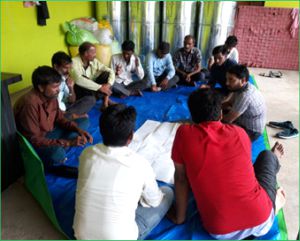|
Communication Facilitating
Watershed is a geo-hydrological unit draining to a common point by a system of drains. Watershed development refers to the conservation, regeneration and the judicious use of all the natural resources particularly land, water, vegetation, animals and human development within the watershed area. Watershed development approach is based on participatory planning which follows a bottom-up approach for developing an appropriate plan for execution, empowerment and employment of people through establishment and strengthening of local level institutions. Different social groups and individual households have varying levels of access to the existing institutions. Vulnerable groups in general have lower institutional access than do those who are more powerful or better off. Before external support for greater adaptive capacity is made available, therefore, an analysis of the nature of institutional linkages and access for different social groups becomes critical. Development Alternatives has acted as the resource agency in Madhya Pradesh for smooth and effective implementation of watershed management. In the community-based participatory watershed development programme, villagers create and maintain the assets and thus have a strong sense of ownership, which is the key to the sustainability of such projects. Effective communication plays a very critical role in the implementation of such watershed programmes.
Communication thus plays an important role in facilitating a clear-cut understanding regarding work and deliverables of the community members. It also helps to bridge the gap between policy framework and practice resulting in building ownership of watershed committees which reflects in effective management of the watershed programme. ■
Rishabh Singh
|
 Alternatives
created tools such as IEC materials to create awareness regfarding the
watershed programme in villages. Exposure visits to watershed projects
in other villages were conducted so the community members understood the
work involved in watershed management and take ownership of the same.
Communication hence assumes a great role in establishing institutions to
facilitate a smooth functioning of the processes influencing watershed
management.
Alternatives
created tools such as IEC materials to create awareness regfarding the
watershed programme in villages. Exposure visits to watershed projects
in other villages were conducted so the community members understood the
work involved in watershed management and take ownership of the same.
Communication hence assumes a great role in establishing institutions to
facilitate a smooth functioning of the processes influencing watershed
management.